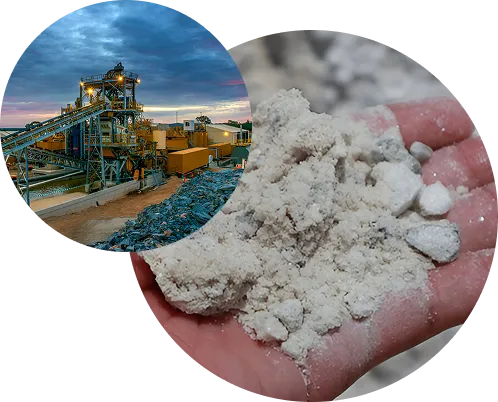
Lighthouse ERP
ERP for Metals and Minerals Industries
Simple to Use
Easy to Implement
Flexible to Customized Solution
The Metals and Minerals industry operates at the core of India’s industrial backbone powering infrastructure, construction, manufacturing, and exports. From iron and steel plants running continuous casting operations to large-scale mineral extraction units dealing with ore quality and grade-specific output, every process in this sector is high-volume, high-risk, and deeply interlinked. A single misstep whether in traceability, dispatch, or contractor management can lead to material wastage, regulatory penalties, or delayed deliveries
Traditional systems simply can’t keep up with the complexity of heat numbers, yield variations, multi-yard inventories, and fluctuating commodity prices. This is where Lighthouse ERP for Metals and Minerals steps in designated not for generic manufacturing but specifically for the intricacies of this sector. From real-time yield monitoring in bauxite plants to automated excise calculation in mining operations. Since 1987, Lighthouse ERP designed for different manufacturing industries known as ERP software for manufacturing industry empowers companies to reduce losses, gain traceability, and scale profitability in a volatile market.

Fabrication units often work with large BOMs, multiple machining stages, and subcontracting tasks. Without ERP, tracking WIP across these scattered processes leads to material loss and missed production deadlines.
In metal industries, one heat number or coil ID can get split into multiple end products. Manual tracking results in zero batch traceability, making recalls or quality checks impossible.
Mineral industries face breakdowns between mining, hauling, crushing, and processing units. Without centralized ERP, these operations operate in isolation, causing delays in dispatch and resource mismanagement.
For mineral processors, actual yield often falls short of expected yield. Lack of real-time monitoring makes it impossible to identify problems or leaks in the value chain.
In metal plants, finished goods are stored in multiple stockyards with different size, shape, grade, and length. Mapping this to the customer-specific order and coordinating dispatch often leads to delays or wrong deliveries.
Prices of metal/mineral fluctuate daily. Without ERP integration to commodity index APIs or rate history, companies cannot generate quotes in real-time or product margin.
With material management modules each raw material unit (e.g., steel slab, ore batch) is assigned a unique ID. This is tracked across melting, rolling, cutting, or blending processes enabling traceability across multiple process levels.
Lighthouse ERP provides real-time comparison between expected and actual yields. For example, if 1000 tons of bauxite are input and only 650 tons of aluminium is extracted (against a standard of 720), the system flags anomalies immediately.
ERP Modules helps in auto-mapping available inventory (grade, length, surface finish) to sales orders. This reduces manual planning, minimizes delivery mismatches, and helps logistics teams avoid shipment delays.
Contractor performance (machine hours, tons moved, safety compliance) is tracked digitally. Payments are linked to actual data, reducing disputes and enhancing accountability at mining sites.
Live data from furnaces, rolling mills, CNCs, or crushers is pushed into centralized dashboards. Plant heads can view operational status shift-wise and prevent problems from dingle control rooms.
ERP uses historical pricing and real-time index data (e.g., LME for aluminium or MCX for steel) to help the sales team forecast raw material costs and lock in profitable deals in advance.
Assigns unique identifiers to each raw material lot tracks through processing stages.
Manages stock based on chemical composition, tensile strength, size, dimensional specs, and finishing type essential for metals and alloys.
Plans jobs based on machine availability, order deadlines, and material readiness.
Tracks output per shift, machine performance, and ore quality integrated with GPS/IoT where applicable.
Automatically calculate mining royalties and create govt.- compliant documentation.
Matches delivery vehicle capacity and material dimensions to exact customer orders.
Visual dashboards show material input vs output variance, helping mineral processors optimize crushing, screening, and washing operations.
The Finance module enables seamless management of accounts, budgeting, financial reporting, and audits. It helps track all financial transactions, ensuring accurate records and compliance with industry standards.
This module ensures that all raw materials are tracked efficiently, from procurement to inventory management. It helps minimize waste and ensures that sufficient materials are available for production without overstocking.
The Sales and Distribution module facilitates order management, pricing, invoicing, and customer relationship management (CRM). It ensures that sales processes are executed smoothly, providing real-time visibility into order statuses and customer requirements.
This module focuses on managing the production process, ensuring optimal resource utilization and scheduling. It also includes built-in quality control checks, helping to monitor product quality at each stage of production.
ERP for the metal industry integrates security controls to monitor and secure sensitive data and ensure access control. The weighbridge module facilitates the weighing of materials, ensuring accurate measurements and reducing the risk of errors during transportation and storage.
The logistics module streamlines the management of distribution, transportation, and delivery operations. It ensures timely deliveries and enhances the coordination between suppliers, manufacturers, and customers.